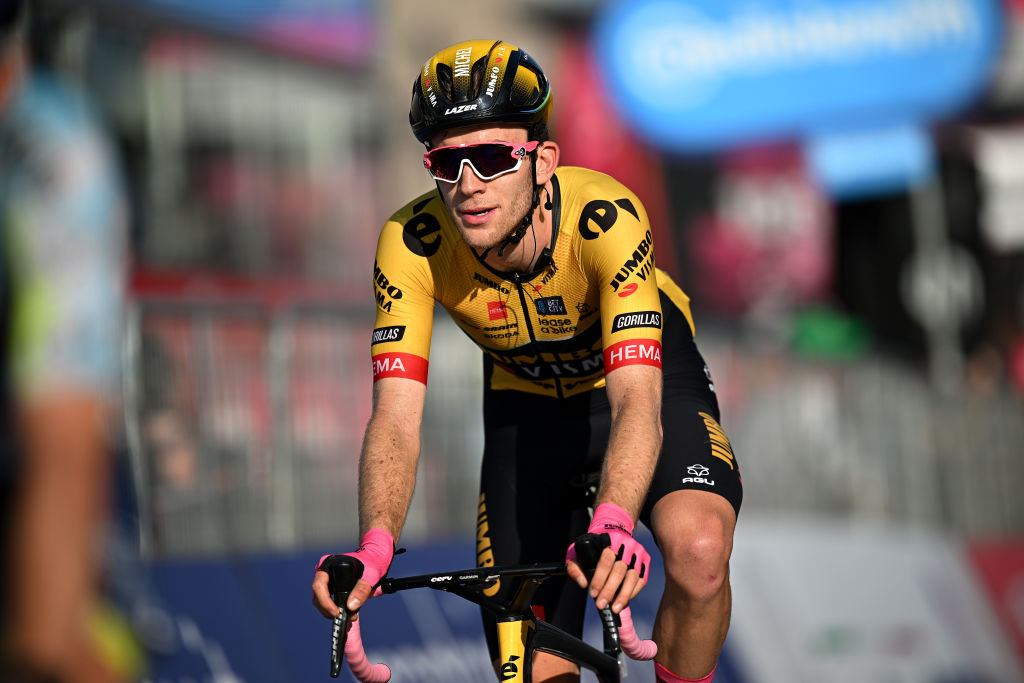Jumbo-Visma to 'look ourselves in the mirror' after Hessmann anti-doping case
Team manager Richard Plugge details team's anti-doping stance after German rider tests positive for banned diuretic

Jumbo-Visma team manager Richard Plugge has spoken about doping in cycling and specifically about the ‘black day’ during the summer when the team learned that Michel Hessmann returning a positive anti-doping test for an unnamed diuretic, the team’s first anti-doping case for a decade.
The Dutch team provisionally suspended Hessmann two months after an out-of-competition test on June 14 in Germany detected a banned substance. The 22-year-old is also under investigation by German police.
“August 16, 2023 was a black day for our team,” said Plugge in his column for WielerFlits’ RIDE Magazine and obtained in full by Cyclingnews.
“For the first time in ten years, we received the message that a rider from our team, Michel Hessmann, had taken a positive doping test.
“It remains an open topic of discussion and the riders also keep each other on their toes. Unfortunately, it went wrong and then a lot came our way.
“We have to look in the mirror ourselves, are we doing everything right?”
Hessmann needs to explains why he tested positive for the diuretic or potentially face a ban of up to four years under the World Anti-Doping Agency code. He still faces a two-year if can prove he unknowingly took the banned substance via an contaminated supplement. Doping is a criminal offence in Germany but the 2015 law has not led to any incarceration of German athletes.
Get The Leadout Newsletter
The latest race content, interviews, features, reviews and expert buying guides, direct to your inbox!
“Everyone involved in and with our organization must be aware of everything," Plugge said of Jumbo-Visma's stance and internal rules.
"Germany has a doping law, so the public prosecutor's office is automatically involved. Criminal law has the presumption of innocence, while disciplinary law reasons the other way around. It is up to the athlete to prove that he has done nothing wrong.”
Plugge spoke retrospectively of the team’s past right back to their former sponsor Rabobank and cycling’s dark days of doping in the 1990s and 2000s with reference to the team’s rebrand in 2013 as Blanco and his aims to “build a cycling team from a blank sheet of paper” and “end an era”.
Hessmann’s positive test has damaged the team’s reputation in recent weeks especially amidst their total domination of the Vuelta a España, taking out the top three spots on the podium with Sepp Kuss, Jonas Vingegaard and Primož Roglič, while also completing the trilogy of Grand Tour victories in one season with the three riders mentioned.
Vingegaard echoed his sentiments from this year’s Tour de France at the Vuelta, insisting that he himself was not taking anything during a press conference in the third week.
“For sure we understand the scepticism, but people should know how much we sacrifice for everything, how much we go into the details,” Vingegaard said.
“It’s always good to be sceptical, especially when a team is doing well, as long as it’s not allegations.
“I think as long as we speak about it because of what happened 20 years ago then I think, hopefully, we can prevent it happening again.
“I’m 100% sure my two colleagues here [Kuss and Roglič] are not taking anything - as well as myself.”
Investigative journalist Edmund Willison responded to the Dane’s comments in a tweet, with the context of Hessmann’s positive leaving a blemish on Jumbo-Visma’s reputation as a clean team.
“Jonas Vingegaard says he is sure that neither he nor his 2 teammates Sepp Kuss and Primož Roglič are doping. Well, he can’t say that about another Jumbo Visma teammate, Michel Hessmann, who was busted in June after riding for Roglič at the Giro,” said Willison.
Plugge ended his column in the Ride magazine by highlighting the meticulous process Jumbo-Visma go through to ensure no contaminated supplements or medicines are accidentally taken by their riders.
“In short, an athlete cannot simply take a supplement, medicine or energy drink without knowing whether it has been tested beforehand,” continued Plugge. “There can be a (in or out-of-competition) doping control 365 days a year, the athlete must be careful every day.
“This is part of cycling's policy, riders are checked between thirty and 150 times (the many winners or leaders' jersey wearers) per year.
“That is good and should remain that way. We stand for fair sport in which talents cross swords on equal grounds. So that in cycling we only have clean days.”

James Moultrie is a gold-standard NCTJ journalist who joined Cyclingnews as a News Writer in 2023 after originally contributing as a freelancer for eight months, during which time he also wrote for Eurosport, Rouleur and Cycling Weekly. Prior to joining the team he reported on races such as Paris-Roubaix and the Giro d’Italia Donne for Eurosport and has interviewed some of the sport’s top riders in Chloé Dygert, Lizzie Deignan and Wout van Aert. Outside of cycling, he spends the majority of his time watching other sports – rugby, football, cricket, and American Football to name a few.